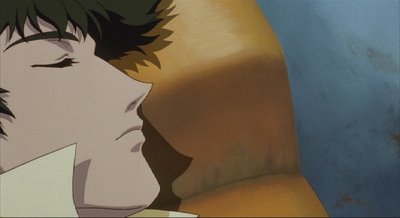Maisa
I'm thinking about doing a paper on Cowboy Bopeep/ Cowboy Bebop for an anime journal. The theme of the issue is "The Limits of the Human." This of course usually translates into Ghost in the Shell type interventions which question the status of humans as the products of our knowledge reveal the horrifying lack of a gap between our loves and hopes and science. (The opening quote taken from Tomorrow's Eve, "If our Gods and our hopes are nothing but scientific phenomena, then let us admit it must be said that our love is scientific as well.")
To be truthful however, these types of interventions do get tiresome after a while. What I would want if I do write this article is to focus on the limits of the human within the human. One finds a plethora of examples of this in Lacanian theory, through Zizek's articulations most frequently around issues of ethics. If for example the human is demarcated through pleasure and pain, then in the death drive we find the limits of the human at the very core of the human. We find something in the human which is beyond the human, a force that persists beyond issues of pleasure and pain, a drive which persists even beyond issues of biological survival.
In contrast to an anime such as Ghost in the Shell, where the limits of the human are commonly understood to be a recent invention or rather a limit revealed by recent interventions, in the ethics of Cowboy Bopeep/ Cowboy Bebop we can see the limits of the human, always already there within the human, quite possibly the thing that makes us most incredibly human.
Here's the last lines from Cowboy Bebop: The Movie, spoken by Spike Speigel, whose (in)actions throughout the anime would provide the basis for my article if I do it:
English audio:
He was just, he was always alone. Always by himself.
Never anyone to share the game.
A man who lived in dreams.
That's who he was.
French:
ll etait toujours solitaire, toujours seul.
Jamais personne pour faire une partie avec lui.
ll vivait dans un autre monde.
C'etait ce genre de gars.
subtitles:
He was always alone, always by himself.
Never anyone to share the game.
He lived in another world.
He was that kinda guy.

To be truthful however, these types of interventions do get tiresome after a while. What I would want if I do write this article is to focus on the limits of the human within the human. One finds a plethora of examples of this in Lacanian theory, through Zizek's articulations most frequently around issues of ethics. If for example the human is demarcated through pleasure and pain, then in the death drive we find the limits of the human at the very core of the human. We find something in the human which is beyond the human, a force that persists beyond issues of pleasure and pain, a drive which persists even beyond issues of biological survival.
In contrast to an anime such as Ghost in the Shell, where the limits of the human are commonly understood to be a recent invention or rather a limit revealed by recent interventions, in the ethics of Cowboy Bopeep/ Cowboy Bebop we can see the limits of the human, always already there within the human, quite possibly the thing that makes us most incredibly human.
Here's the last lines from Cowboy Bebop: The Movie, spoken by Spike Speigel, whose (in)actions throughout the anime would provide the basis for my article if I do it:
English audio:
He was just, he was always alone. Always by himself.
Never anyone to share the game.
A man who lived in dreams.
That's who he was.
French:
ll etait toujours solitaire, toujours seul.
Jamais personne pour faire une partie avec lui.
ll vivait dans un autre monde.
C'etait ce genre de gars.
subtitles:
He was always alone, always by himself.
Never anyone to share the game.
He lived in another world.
He was that kinda guy.




Comments
-TQT